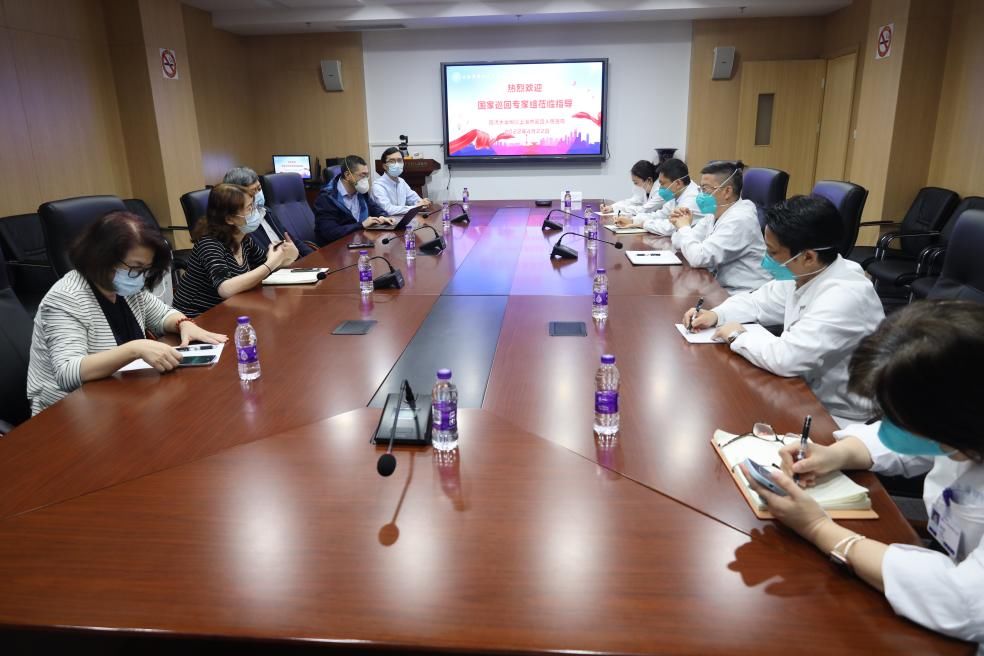
“My son and mother were diagnosed together. After careful treatment by the medical staff of Shanghai Fourth Hospital, we recovered quickly. Today We are really happy to be able to celebrate our son’s birthday at home, and we are very grateful to the medical staff who have treated us!” On May 22, 6-year-old Guoguo and his father gave a gift to Shanghai Fourth People’s Hospital affiliated to Tongji University for 19 years. Director Wang Hui of the ward sent a message of thanks and a birthday photo to thank the joint medical team of the hospital for the meticulous treatment.
As of May 22, 2018 patients have been discharged from Shanghai Fourth Hospital, of which nearly 60% are over 70 years old, 262 are aged 90-100, and 262 are aged over 100 15 people.
Xiong Lize, director of Shanghai Fourth People’s Hospital, said that at present, the hospital’s treatment work is entering the final stage, and the number of cured and discharged patients has been higher than the number of admitted patients for several days. Among the patients in the hospital, high-risk elderly patients account for a large proportion, and there is no room for relaxation.
It is understood that since the outbreak in Shanghai, in order to strengthen the treatment of severe and critically ill patients, the National Touring Expert Group has successively sent a number of experts to guide and support the Shanghai Fourth People’s Hospital in the treatment of new crown patients. They mainly come from the majors of respiratory, critical medicine, infectious diseases, geriatric diseases and infection control, and have participated in the prevention and control of new infectious diseases at home and abroad for many times. Over the past 40 days, expert teams at all levels have shared their past anti-epidemic experience with scientific guidance and fought side by side with the Shanghai Fourth Academy day and night.
Mr. Huang Lao, 94 years old, is the first batch of patients admitted after the hospital was converted into a designated hospital for COVID-19. Mr. Huang is an old Red Army and old Party member. When he was admitted to the hospital, he had difficulty breathing, high fever, and his consciousness was close to a coma. The elderly are also complicated by cerebral infarction, hypertension, coronary heart disease, diabetes and other basic diseases.
After admission, multi-disciplinary joint consultations inside and outside the hospital, taking antiviral, low molecular weight heparin, aerosol inhalation and other treatments, at the same time giving new coronary pneumonia recovered patients convalescent plasma clinical treatment, through body position management and respiratory function training , so that the lung ventilation function of the elderly can be fully improved.
Through the joint efforts of the hospital’s medical staff for 48 hours, Mr. Huang turned the corner. On the 3rd day after the transfer, the fever was completely controlled and he regained consciousness. On the 5th day, the new crown nucleic acid test was negative twice and then transferred to a non-designated hospital Continued treatment, and was able to communicate with his family through video when he was discharged from the hospital.
93-year-old grandma Chen was admitted to the Department of Infectious Diseases of the Fourth Hospital of Shanghai on April 18. In addition to the new crown, she also suffers from coronary heart disease, chronic cardiac insufficiency, chronic renal insufficiency, and high-risk hypertension. , cerebral infarction sequelae and other basic diseases.
After admission, the expert group gave antihypertensive, vasodilator, heart rate control, anticoagulation therapy, and oral small molecule antiviral drugs. In order to reassure the family members, the medical staff of the hospital will make videos with the family members when they have time. Recently, Granny Chen has recovered successfully and returned home, and her family sent a letter of thanks.
On April 30, a special patient came to the ward on the 15th floor of Shanghai Fourth Hospital.
Ms. Zhu, 73 years old, received a kidney transplant in 2002 and took long-term oral anti-rejection drugs. The nucleic acid was positive for 5 days and she was admitted to the hospital. He had a history of diabetes and repeated urinary tract infections. After admission, she developed high fever, Escherichia coli drug infection, Staphylococcus aureus urinary tract infection, left arm skin infection, and local skin abscess at the infusion site.
Multiple infections have greatly increased the difficulty of treatment for patients. The ward director has repeatedly asked Shanghai experts for consultation and in-hospital expert consultation, and contacted Shanghai First People’s Hospital, which performed kidney transplantation for Ms. Zhu. The director of the Department of Urology, adjusted the dose of anti-rejection drugs and adjusted the anti-infective treatment plan. After unremitting efforts, the patient’s body temperature has been stable for 3 days, and the basic condition is good.
For more than a month, as a designated hospital in Shanghai Fourth Hospital, the medical system in the hospital has been continuously improved, the medical force has been continuously enriched, the hospital sense management has been strictly standardized, and the logistical support has been fully in place. Efforts are inseparable from the strong support of the State-owned Assets Supervision and Administration Commission of the State Council Joint Medical Team, the Fujian National Critical Care Medical Team, the Shanxi Provincial Medical Team, and the Jiangxi Provincial (Jian, Jiujiang) Medical Team, as well as the guidance of the National Touring Expert Group.
Author: Li Chenyan
Editor: Li Chenyan
p>
Responsible editor: Fan Liping
*Wenhui’s exclusive manuscript, please indicate the source for reprinting.